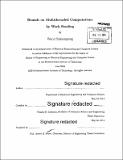Bounds on multithreaded computations by work stealing
Author(s)
Suksompong, Warut
DownloadFull printable version (2.055Mb)
Other Contributors
Massachusetts Institute of Technology. Department of Electrical Engineering and Computer Science.
Advisor
Charles E. Leiserson.
Terms of use
Metadata
Show full item recordAbstract
Blumofe and Leiserson [6] gave the first provably good work-stealing work scheduler for multithreaded computations with dependencies. Their scheduler executes a fully strict (i.e., wellstructured) computation on P processors in expected time [mathematical formula], where T denotes the minimum serial execution time of the multithreaded computation, and T. denotes the minimum execution time with an infinite number of processors. This thesis extends the existing literature in two directions. Firstly, we analyze the number of successful steals in multithreaded computations. The existing literature has dealt with the number of steal attempts without distinguishing between successful and unsuccessful steals. While that approach leads to a fruitful probabilistic analysis, it does not yield an interesting result for a worst-case analysis. We obtain tight upper bounds on the number of successful steals when the computation can be modeled by a computation tree. In particular, if the computation starts with a complete k-ary tree of height h, the maximum number of successful steals is [mathematical formula]. Secondly, we investigate a variant of the work-stealing algorithm that we call the localized work-stealing algorithm. The intuition behind this variant is that because of locality, processors can benefit from working on their own work. Consequently, when a processor is free, it makes a steal attempt to get back its own work. We call this type of steal a steal-back. We show that under the "even distribution of free agents assumption", the expected running time of the algorithm is [mathematical formula]. In addition, we obtain another running-time bound based on ratios between the sizes of serial tasks in the computation. If M denotes the maximum ratio between the largest and the smallest serial tasks of a processor after removing a total of O(P) serial tasks across all processors from consideration, then the expected running time of the algorithm is [mathematical formula].
Description
Thesis: M. Eng., Massachusetts Institute of Technology, Department of Electrical Engineering and Computer Science, 2014. Cataloged from PDF version of thesis. Includes bibliographical references (pages 61-62).
Date issued
2014Department
Massachusetts Institute of Technology. Department of Electrical Engineering and Computer SciencePublisher
Massachusetts Institute of Technology
Keywords
Electrical Engineering and Computer Science.